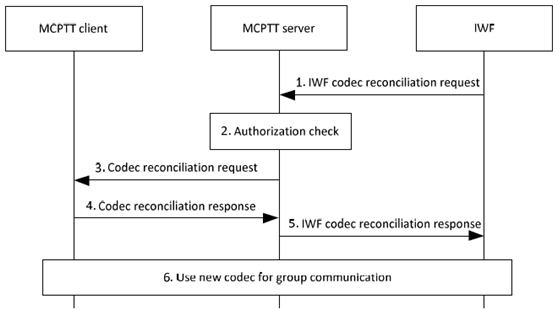Content for TS 23.283 Word version: 18.1.0
1…
10…
10.2…
10.2.2…
10.2.3…
10.3…
10.3.3…
10.3.3.7…
10.3.4…
10.3.4.4…
10.3.5…
10.3.5.8…
10.3.6…
10.3.7…
10.3.7.5…
10.3.8…
10.4…
10.4.4…
10.5…
10.5.7…
10.6…
10.6.2…
10.6.2.3…
10.6.3…
10.6.4…
10.7…
10.8…
10.11…
10.11.4…
10.12…
10.14…
10.15…
10.7 Codec
10.7.1 Information flows for codec
10.7.1.1 IWF codec reconciliation request
10.7.1.2 IWF codec reconciliation response
10.7.2 IWF transcoding
10.7.3 Codec negotiation by the LMR system
...
...
10.7 Codec p. 144
10.7.1 Information flows for codec p. 144
10.7.1.1 IWF codec reconciliation request p. 144
Table 10.7.1.1-1 describes the information flow IWF codec reconciliation request from the IWF to the MCPTT server.
| Information element | Status | Description |
|---|---|---|
| MCPTT group ID | M | The MCPTT group ID for which a codec change is requested. |
| Codec type | M | Type of the requested codec |
10.7.1.2 IWF codec reconciliation response p. 144
Table 10.7.1.2-1 describes the information flow IWF codec reconciliation response from the MCPTT server to the IWF.
| Information element | Status | Description |
|---|---|---|
| MCPTT group ID | M | The MCPTT group ID for which a codec change was requested. |
| Result | M | Result indicates success or failure of the requested codec change. |
10.7.2 IWF transcoding p. 144
The IWF can be used to transcode voice packets in transit between the LMR and MCPTT systems. In this scenario, the MCPTT system can operate its own vocoder type and the LMR system can operate its own vocoder type. The type of vocoder used on the LMR side is outside the scope of the present document.
When operating in this mode, the IWF converts voice media formats between the two sides. Vocoder negotiation is according to procedures in the present document.
10.7.3 Codec negotiation by the LMR system p. 144
10.7.3.1 Description p. 144
An MCPTT group may be configured to use an LMR speech codec, such that speech can be carried end to end between all group members in both LMR and MCPTT system without transcoding.
An LMR system can support more than one speech codec; for example P25 supports both a full rate and a half rate speech codec. Circumstances within the LMR system might require that the codec in use within a group is changed according to the needs of the LMR system.
Figure 10.7.3.1-1 below illustrates a procedure which allows the LMR system to change the speech codec within an MCPTT group that is connected to the LMR system via the IWF.
Pre-conditions:
- Group members have affiliated to the MCPTT group in both the LMR system and in the MCPTT system
- A permitted LMR codec has been negotiated for use by MCPTT group members
- MCPTT group members support the requested second LMR speech codec
- The LMR system requires a change to an alternative speech codec.

Step 1.
The IWF sends a codec reconciliation request to the MCPTT server on behalf of the LMR system.
Step 2.
The MCPTT server checks that the requested codec is permitted for the MCPTT group.
Step 3.
The MCPTT server sends a codec reconciliation request to all of the affilliated MCPTT client(s) to negotiate the use of the speech codec requested by the LMR system.
Step 4.
The MCPTT client replies with a codec reconciliation response to the MCPTT server, indicating acceptance of the new speech codec.
Step 5.
The MCPTT server sends a codec reconciliation response to the IWF.
Step 6.
Further transmissions in the MCPTT group use the new codec in the media plane.